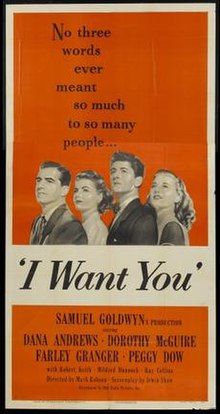I Want You (1951 film)
| I Want You | |
|---|---|
 | |
| Directed by | Mark Robson |
| Written by | Irwin Shaw |
| Produced by | Samuel Goldwyn |
| Starring | Dana Andrews |
| Cinematography | Harry Stradling |
| Edited by | Daniel Mandell |
| Music by | Leigh Harline |
Production company | |
| Distributed by | RKO Radio Pictures |
Release date |
|
Running time | 102 minutes |
| Country | United States |
| Language | English |
| Box office | $1.5 million (US rentals)[1] |
I Want You is a 1951 film directed by Mark Robson taking place in America during the Korean War. The film was nominated for the Academy Award for Best Sound (Gordon E. Sawyer).[2]
Plot
In the "early summer of 1950", Martin Greer owns a small construction company. An Army combat engineer for four years during World War II, he and wife Nancy have two young children. George Kress asks Martin to write a letter to the Selective Service System stating that his son, George Jr., is "indispensable" for their company and thus exempt from the draft. Martin refuses, and George Jr. joins the Army as the Korean War begins.
Martin's younger brother Jack is in love with college student Carrie Turner. Despite a trick knee he is drafted; Jack suspects that her father, who is on the local draft board and opposes their relationship, is the reason. His mother, who lost a son during the last war, asks Martin to write an "indispensable" letter for his brother; he seriously considers it but does not do so, and Nancy criticizes Jack for his reluctance to serve. Jack joins the Army, where he briefly sees George Jr. before the latter goes to Korea.
The Army reports that George Jr. is missing in action, and his father drunkenly blames Martin. His former superior officer, having rejoined the military, asks Martin to join him; although eligible for exemptions, he agrees. Jack and Carrie marry during a furlough before he also goes overseas.
References
- ^ 'Top Box-Office Hits of 1952', Variety, January 7, 1953
- ^ "The 24th Academy Awards (1952) Nominees and Winners". oscars.org. Retrieved 2011-08-20.
External links
- I Want You at IMDb
